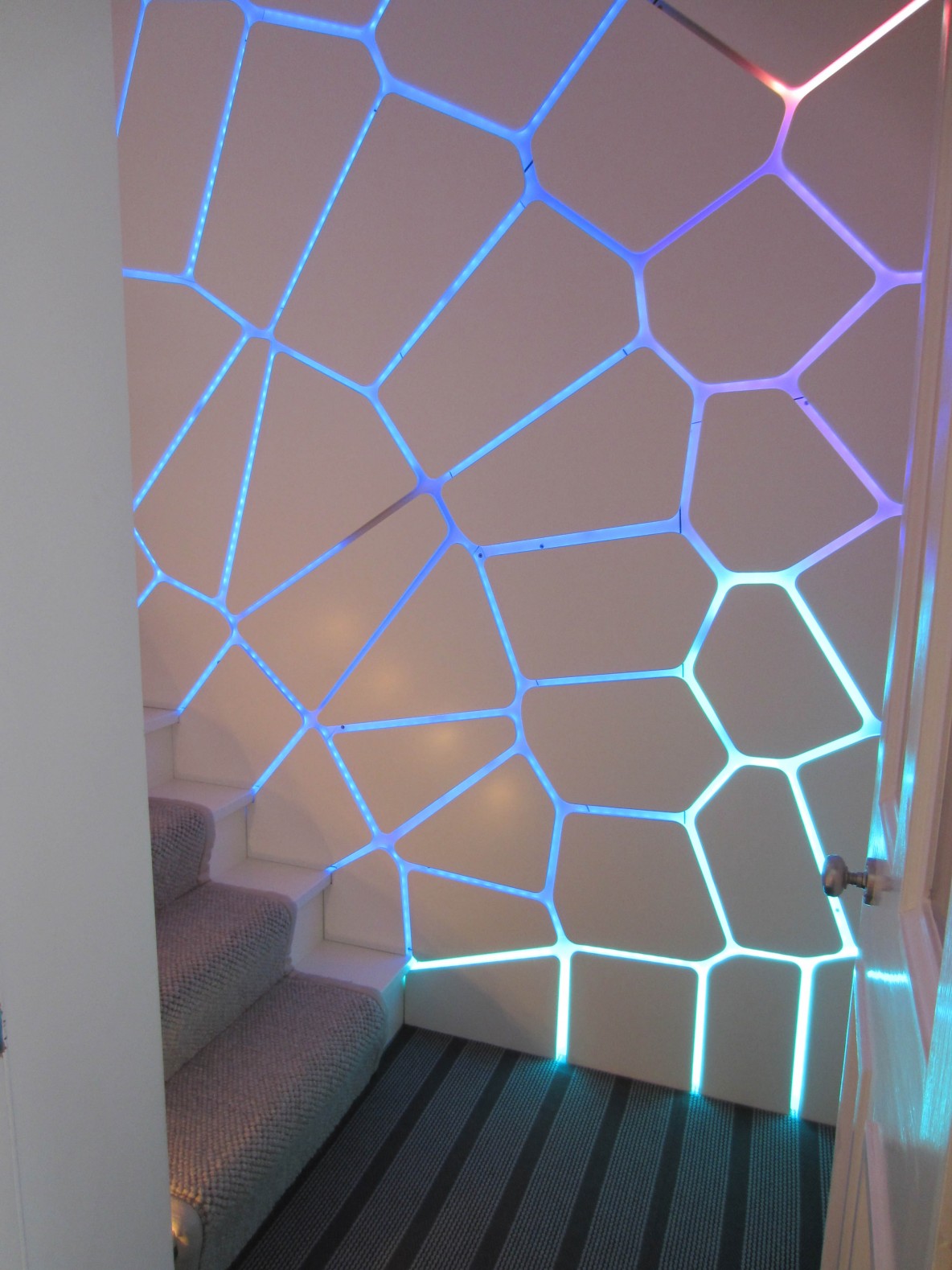Spidey Wall is the name for a physical wall lit up by multiple addressable LED strips. This program is an LPC1768 web server to control the wall from a browser.
Dependencies: EthernetInterfacePlusHostname RdWebServer mbed-rtos mbed
This project is part of a Light-Wall using addressable LED strips (WS2801). I have published a few posts on my blog about the construction of the wall and building a game to play on it (PacMan). I have also had a guest post from a friend who has set his children the task of producing some interesting animations. The original post is http://robdobson.com/2015/07/spidey-wall/ 
So far, however, I hadn't fully connected the physical (and electronic) wall with the web-browser creations to drive it. This project is hopefully the final link. A fast and reliable web server using REST commands to drive the 1686 LEDs in the Spidey Wall from code running in a browser (say on an iPad while you are playing a game).
The approach taken here results in the ability to control the RGB values of all 1686 LEDs at a rate of 20 frames per second.
A blog post describing the whole thing is here:
http://robdobson.com/2015/08/a-reliable-mbed-webserver/
main.cpp
- Committer:
- Bobty
- Date:
- 2015-09-03
- Revision:
- 6:8df79fe1afcd
- Parent:
- 5:910909f34907
File content as of revision 6:8df79fe1afcd:
//
// LightWall WebServer
//
// Rob Dobson (C) 2015
//
// See http://robdobson.com/2015/07/spidey-wall/ and http://robdobson.com/2015/08/a-reliable-mbed-webserver/
//
#include "mbed.h"
#include "EthernetInterface.h"
#include "RdWebServer.h"
#include "DrawingManager.h"
#include "Idler.h"
#include <string.h>
// Web port
const int WEBPORT = 80; // Port for web server
// Debugging and status
RawSerial pc(USBTX, USBRX);
DigitalOut led1(LED1); // flashes on command received
DigitalOut led2(LED2); //
DigitalOut led3(LED3); //
DigitalOut led4(LED4); // web server status
// System configuration
char systemName[20] = "LightWall";
int systemNumLEDS = 20;
int systemLEDSSplitPoint = systemNumLEDS;
// Drawing Manager
DrawingManager drawingManager;
// Idler - to display something when not being driven by the web interface
Idler idler(&led2, &drawingManager);
// General response string for REST requests
char* generalRespStr = "HTTP/1.1 200 OK\r\nConnection: keep-alive\r\nAccess-Control-Allow-Origin: *\r\nAccess-Control-Allow-Methods: POST, GET, OPTIONS\r\nAccess-Control-Allow-Headers:accept, content-type\r\nContent-Length: 0\r\nContent-Type: application/octet-stream\r\n\r\n";
// Get system name - No arguments required
char* lightwallGetSystemName(int method, char*cmdStr, char* argStr, char* msgBuffer, int msgLen,
int contentLen, unsigned char* pPayload, int payloadLen, int splitPayloadPos)
{
// Return the system name
return systemName;
}
// Clear LEDS - No arguments required
char* lightwallClear(int method, char*cmdStr, char* argStr, char* msgBuffer, int msgLen,
int contentLen, unsigned char* pPayload, int payloadLen, int splitPayloadPos)
{
idler.notIdle();
drawingManager.Clear();
return generalRespStr;
}
// RawFill - arguments for start LED (e.g. /rawfill?start=0)
// - payload of message contains binary data for RGB (1 byte for each) for each LED to be set
char* lightwallRawFill(int method, char*cmdStr, char* argStr, char* msgBuffer, int msgLen,
int contentLen, unsigned char* pPayload, int payloadLen, int splitPayloadPos)
{
idler.notIdle();
drawingManager.RawFill(argStr, pPayload, payloadLen, splitPayloadPos);
return generalRespStr;
}
// Fill - arguments for start, numLeds, initial-R/G/B and ending-R/G/B (optional)
// - e.g. /fill?start=0&len=100&r1=20&g1=30&b1=50
// - e.g. /fill?start=0&len=100&r1=20&g1=30&b1=50&r2=50&g2=100&b2=23
char* lightwallFill(int method, char*cmdStr, char* argStr, char* msgBuffer, int msgLen,
int contentLen, unsigned char* pPayload, int payloadLen, int splitPayloadPos)
{
idler.notIdle();
drawingManager.Fill(argStr);
return generalRespStr;
}
// ShowLeds - no arguments
char* lightwallShowLeds(int method, char*cmdStr, char* argStr, char* msgBuffer, int msgLen,
int contentLen, unsigned char* pPayload, int payloadLen, int splitPayloadPos)
{
// Blink LED
led1 = !led1;
// Show LEDS
idler.notIdle();
drawingManager.ShowLeds();
return generalRespStr;
}
// Create, configure and run the web server
void http_server(void const* arg)
{
// Init the web server
pc.printf("Starting web server\r\n");
char* baseWebFolder = "/sd/"; // should be /sd/ for SDcard files - not used for local file system
RdWebServer webServer;
// Add commands to handle the home page and favicon
webServer.addCommand("", RdWebServerCmdDef::CMD_LOCALFILE, NULL, "index.htm", true);
webServer.addCommand("favicon.ico", RdWebServerCmdDef::CMD_LOCALFILE, NULL, NULL, true);
// Add the lightwall control commands
webServer.addCommand("name", RdWebServerCmdDef::CMD_CALLBACK, &lightwallGetSystemName);
webServer.addCommand("clear", RdWebServerCmdDef::CMD_CALLBACK, &lightwallClear);
webServer.addCommand("rawfill", RdWebServerCmdDef::CMD_CALLBACK, &lightwallRawFill);
webServer.addCommand("fill", RdWebServerCmdDef::CMD_CALLBACK, &lightwallFill);
webServer.addCommand("showleds", RdWebServerCmdDef::CMD_CALLBACK, &lightwallShowLeds);
// Start the server
webServer.init(WEBPORT, &led4, baseWebFolder);
webServer.run();
}
void getSystemConfig()
{
printf("LightWall - Configured for ");
// Check for a config file on the local file system
LocalFileSystem local("local");
FILE* fp = fopen("/local/lights.txt", "r");
if (fp != NULL)
{
char buf[201];
buf[sizeof(buf)-1] = 0;
int nread = fread(buf, 1, sizeof(buf), fp);
if (nread > 0 && nread <= sizeof(buf))
{
buf[nread] = 0;
// Read config details from the file
sscanf(buf, "%s %d %d", systemName, &systemNumLEDS, &systemLEDSSplitPoint);
}
fclose(fp);
printf("%s (%d LEDs, Split at %d)", systemName, systemNumLEDS, systemLEDSSplitPoint);
printf("\r\n");
}
}
int main()
{
// Init
pc.baud(115200);
pc.printf("Light Wall - Rob Dobson 2015\r\n");
// Wait for a moment
wait(1);
// Get the configuration of the system
getSystemConfig();
// Drawing manager controls the LEDs
drawingManager.Init(systemNumLEDS, systemLEDSSplitPoint);
// Start idler
idler.start();
// Setup ethernet interface
char macAddr[6];
mbed_mac_address(macAddr);
pc.printf("Ethernet MAC address: %02x:%02x:%02x:%02x:%02x:%02x\r\n", macAddr[0], macAddr[1], macAddr[2], macAddr[3], macAddr[4], macAddr[5]);
pc.printf("Connecting to ethernet ...\r\n");
// Init ethernet
EthernetInterface::init();
// Using code described here https://developer.mbed.org/questions/1602/How-to-set-the-TCPIP-stack-s-hostname-pr/
// to setName on the ethernet interface
EthernetInterface::setName(systemName);
// Connect ethernet
EthernetInterface::connect();
pc.printf("IP Address: %s HostName %s\r\n", EthernetInterface::getIPAddress(), EthernetInterface::getName());
// Web Server used to run in a thread - but I've found this slows performance a lot as described here:
// http://robdobson.com/2015/08/a-reliable-mbed-webserver/
// Fortunately it doesn't matter as the LED code is all interrupt driven
// This is the previous code...
// Thread httpServer(&http_server, NULL, osPriorityNormal, (DEFAULT_STACK_SIZE * 3));
http_server("");
// Forever - actually it won't even get here as the server has a forever loop in it too
while(true)
{
}
}